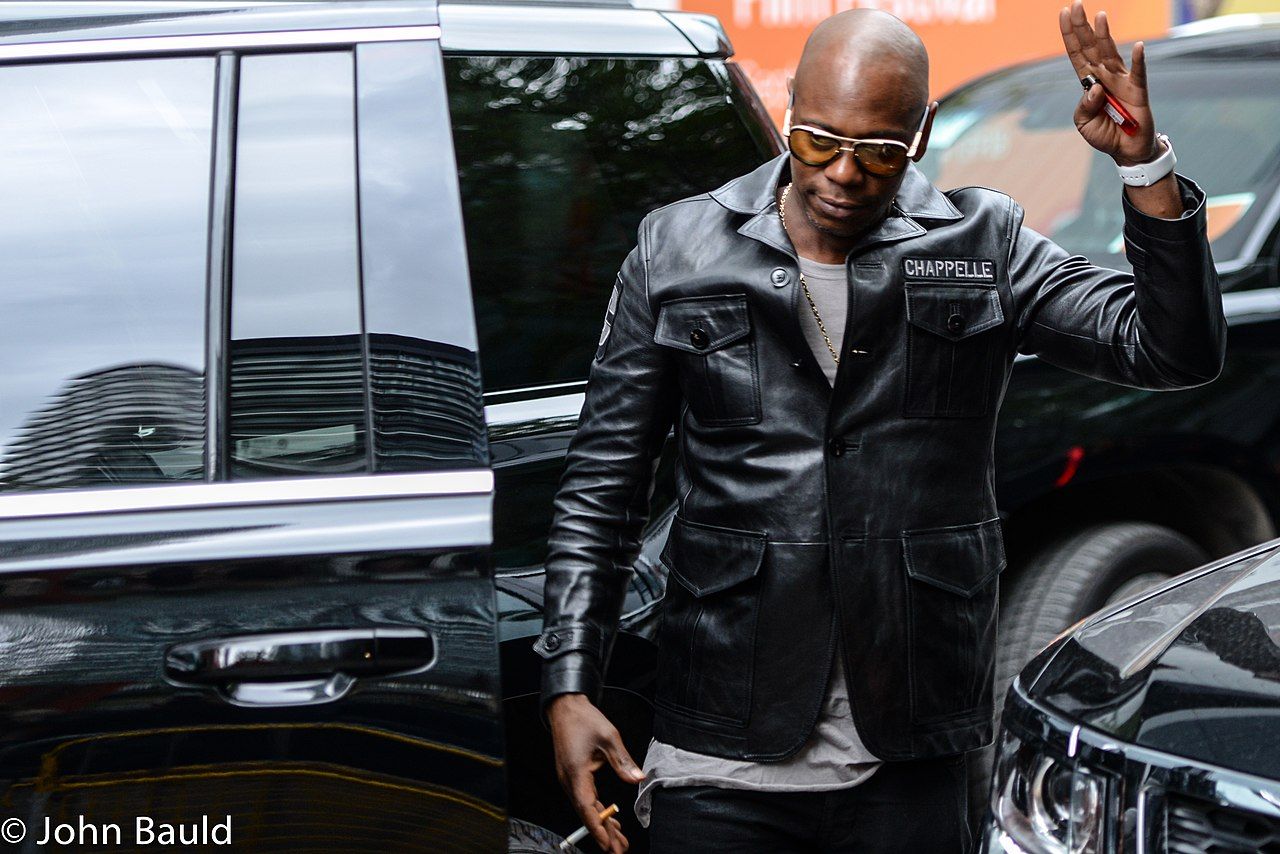Dave Chappelle’s The Closer: Empathetic Transgressions
What is a woman? Dave Chappelle's controversial special The Closer explores the contradictions of gender in a disarmingly empathetic tour de force. Chappelle isn’t “punching down” at the trans community. What he’s doing is way more subversive...

Contradiction is central to comedy. A joke’s setup misleads the audience in one direction, and the punchline reveals some other, unexpected, perspective that is also valid. Contradictions are never really contradictions, of course. Reality is what it is, and contradictions are created by differing human interpretations of it. Comedians—my tribe—are the explorers and “exposers” of that territory.
Reality is messy, it doesn’t fit neatly into boxes. Thus, we seek common understanding through mutual engagement, debate, persuasion, and appeals to rationality and logic. Well, at least some of us do. In the last decade we’ve seen the rise of a hyper-vocal minority that rejects those Enlightenment values and practices. They want to tell us which boxes reality goes in, and threaten to punish us if we don’t play along.
If you haven’t seen Dave Chappelle’s controversial Netflix special The Closer yet, do. You have the right to make up your own mind, and you should exercise it. I’m going to be discussing some of the criticism Chappelle has received, and will be revealing some of the jokes, so—spoiler alert.
Complaints that the special was “not that funny” are missing the point. Chappelle is explicit about his goal for the evening:
This is my last special because I have an objective tonight. I came here tonight because this body of work that I’ve done on Netflix I’m going to complete. All the questions you might have had about all these jokes I’ve said in the last few years, I hope to answer tonight. And I would like to start by addressing the LBGTQ community, correctly.
Stand-up comedy is the art form, but here, social commentary is the content. Chappelle is addressing his detractors directly, which is certainly a gesture of respect. He didn’t have to do it. He could have ignored them. There are hundreds of topics he could have chosen.
Whatever humor it held for the individual viewer, The Closer was also a vigorous reply to the attacks mounted against him. Trans activists must be recognized for having pushed trans issues to the forefront of the culture wars. Their attempts to cancel Chappelle, unsuccessful though they’ve been, have resulted in him using his platform to bring national attention to their cause. They have earned this high-profile response.
One of the contradictions explored in The Closer has to do with gender. For over 500 years, the word gender has been a less-used synonym for sex. In the last 40 years, however, gender has also come to mean something else. In social science, gender can be seen as a social construct which can be “deconstructed.” That’s not a bad thing, since we all benefit by being liberated from constricting gender roles.
But while gender as social construct is somewhat arbitrary, gender as biology can’t be deconstructed so easily. This contradiction in the meanings we attach to gender is crucial.
And now we get to the core of the crisis. What is a woman? What is that, in this day and time?
Trans activists have taken the relative plasticity of gender as-social-construct, and applied it to gender as biology. And then insisted that everyone must believe, as they do, that “trans women are women.” And then enforced that insistence by denouncing public figures who demur for transphobia and bigotry—and attempting to destroy their careers.
This blurring of the distinction between the biological and social definitions of gender can be seen in this explication from seminal gender theorist, Judith Butler.
Gender is an assignment that does not just happen once: it is ongoing. We are assigned a sex at birth and then a slew of expectations follow which continue to “assign” gender to us. The powers that do that are part of an apparatus of gender that assigns and reassigns norms to bodies, organises them socially, but also animates them in directions contrary to those norms.
Perhaps we should think of gender as something that is imposed at birth, through sex assignment and all the cultural assumptions that usually go along with that. Yet gender is also what is made along the way – we can take over the power of assignment, make it into self-assignment, which can include sex reassignment at a legal and medical level.
— Judith Butler, in The Guardian
Clearly, some people have taken Butler’s theories to heart, and believe they can literally change their biological gender through medical sex reassignment. Unfortunately though, whether the process actually results in a change of gender is a matter of opinion. Chappelle raises the question with one of his more vulgar jokes. Is a surgically simulated vagina the same as a real one? If you don’t think so, can you be required to pretend that you do? Should you be punished if you don’t? To disagree is heresy to the trans community, and it’s easy to imagine why that would be the case, but disagreement is not harm. On the contrary, an honest expression of disagreement is a sign of respect.
Setting aside the medical and legal aspects of sex reassignment, when it comes to social ramifications it’s more personal. This is where the trans agenda (i.e. acceptance of their re-assigned gender) is revealed as unworkable. While I hope we all agree that trans people should be treated with kindness, compassion and respect, there is going to be a sizeable majority that rejects the underlying assertion that (biological) gender is socially constructed or a mere matter of choice.
Trans activists are up in arms, accusing Chappelle of “punching down” and “harming” trans people. Some of the outraged responses, though, leave one wondering if his critics have even seen the special, or perhaps don’t understand how jokes work. Is there any joke in the special where we’re laughing at trans people? I don’t think so. I never was.
If Chappelle were deriding trans people, among the most vulnerable in our society, that would indeed be disgraceful. If his jokes were malicious that would be abhorrent, and definitely not funny. But that’s simply not what he’s doing. Yes, he pointedly disagrees with trans doctrine. But make no mistake, Chappelle’s real target is hypocrisy.
When he says “Caitlyn Jenner was voted woman of the year her first year as a woman... Beat every bitch in Detroit. She’s better than all of you,” it is not to mock her, nor trans women. It is to express the opinion that a man who has genital surgery, breast implants and a life-long dependency on hormones is not the same as a woman. As he says repeatedly, “gender is a fact.” That’s his opinion. The real target of the joke is those of us who don't buy the woke dogma that “trans women are women” —but pretend we do.
The Closer encourages us to see each other’s humanity and to respect it. It’s just that the ultimate way to show respect isn’t to indulge each other’s wishful thinking, it’s to be honest. Respect doesn’t mean agreement. It means sharing one’s true thoughts and feelings even when they may upset the person you are sharing them with. As a corollary, respect means hearing words one finds objectionable without trying to annihilate the person speaking them.
As he expressed on another occasion:
I support anyone’s right to be who they want to be. My question is: to what extent do I have to participate in your self-image?
It’s evident that Chappelle thinks we’re not obligated to participate in each other’s self-image. I would add that shaming people into participating in one’s self-image won’t work, either. In fact, it will backfire. Trans activists really need to come up with a better response to that question than “agree with us or we will destroy you.”
There is much that could be said about the heartbreaking story of his friendship with transgender comedian, Daphne Dorman. I’ll just say this. After telling the story, Chappelle mentions that he has set up a trust fund for Daphne’s young daughter. When she is old enough to receive the money, and have the conversation,
I’ll tell that little girl, “Young lady, I knew your father... and he was a wonderful woman.”
In that single punchline Chappelle adroitly coalesces his arguments. In his imagined conversation he addresses a young woman who has, more than anyone, a right to hear the truth spoken; and at the same time an innocence, since her age precludes her understanding the issues swirling around her father’s death. Yes, her father’s death, because paternity is the biological fact of the matter. The sentence closes with the gracious acceptance of Dorman’s self-identification as a woman—a “wonderful woman,” at that. That one line artfully and compassionately encapsulates the gender contradiction.
No, Chappelle isn’t “punching down” at the trans community. What he’s doing is way more subversive. He’s appealing to their humanity.
With outrage the weapon of choice in the woke arsenal, Chappelle deftly disarms them. He draws attention to the malignancy and spitefulness of their tactics of shaming, berating, and cancellation. In short, he highlights their lack of empathy.
Empathy is not gay. Empathy is not black. Empathy is bi-sexual. It must go both ways. It must go both ways.
What Chappelle has done must seem unforgivable. The more that trans activists pursue the tactics of cancellation, the more they substantiate the charge. He’s short-circuited their modus operandi, and there are bound to be sparks.
I’d say the ball is now in their court.
